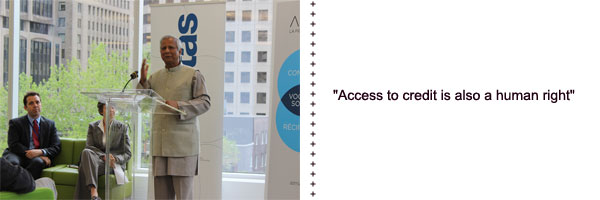Today, Nobel Prize Winner Muhammad Yunus, Laureate of the 2011 Equitas Award for Human Rights Education, finally received his award as he attended a ceremony hosted by Equitas’ corporate sponsor Aimia, in Montreal. He took the opportunity to share some reflections on the link between human rights education and his groundbreaking work on microfinance and social business.
“Access to credit is also a human right” he said to a crowd comprised of Aimia employees and many others.
The Chair of Equitas Board of Directors and Executive in Residence at McGill University’s Desautels Faculty of Management, Melissa Sonberg, presented the 2011 Equitas Award for Human Rights Education to Prof. Yunus. “We are delighted that Prof. Yunus has finally made it to Montreal to accept our Award in person”, she said.
This award was created in 2009 to recognize individuals or organizations who have made exceptional contributions to advancing equality, social justice and respect for human dignity. Past recipients include Phil Fontaine (former National Chief of the Assembly of First Nations), Asma Jahangir (Former UN Special Rapporteur on Freedom of Religion or Belief), the Youth Leadership Development Foundation of Yemen and the Society for Children and Youth of British Columbia.

“The work of social change is never easy. It requires intelligence, imagination, passion and commitment – qualities which Prof. Yunus possesses in spades as well as many more”, Sonberg adds.
Economist and Nobel Peace Laureate Muhammad Yunus is internationally renowned for his revolutionary system of micro-credit (small loans to entrepreneurs too poor to qualify for traditional bank loans) that has helped millions, particularly the most marginalized women, to escape poverty.
According to Professor Yunus, poverty means being deprived of all human value. He regards micro-credit both as a human right and as an effective means of emerging from poverty. “Poverty is the absence of all human rights. The frustrations, hostility and anger generated by abject poverty cannot sustain peace in any society. For building stable peace we must find ways to provide opportunities for people to live decent lives.”
Born in the seaport city of Chittagong, Bangladesh, Yunus’ life is motivated by his vision of a world without poverty. It began in 1976, when he saw village basket weavers living in abject poverty despite their skill. Considered poor credit risks, the artisans were forced to borrow money at high interest rates to purchase bamboo and made no profit after repaying moneylenders. From his own pocket, Yunus made a loan to a group of women who repaid the funds and, for the first time, made a small profit. Yunus realized that by means of small loans and financial services, he could help the poor free themselves from poverty.
Through its Yunus Centre, Professor Yunus advocates for the empowerment of women and the use of microcredit. Read more about an Equitas project related to these topics.